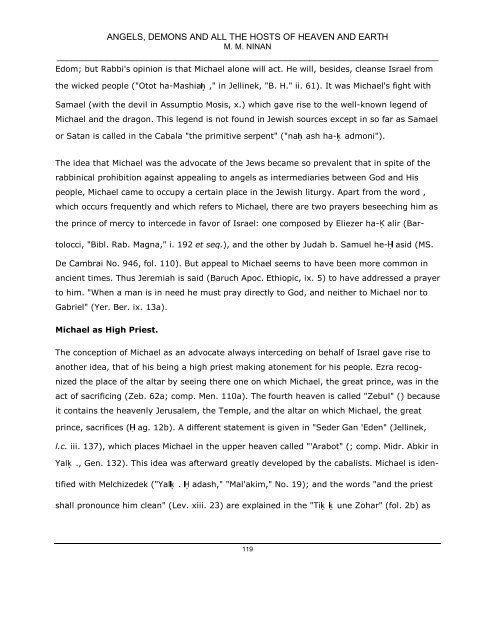Angels, Demons and all the Hosts
You also want an ePaper? Increase the reach of your titles
YUMPU automatically turns print PDFs into web optimized ePapers that Google loves.
ANGELS, DEMONS AND ALL THE HOSTS OF HEAVEN AND EARTH<br />
M. M. NINAN<br />
_____________________________________________________________________________<br />
Edom; but Rabbi's opinion is that Michael alone will act. He will, besides, cleanse Israel from<br />
<strong>the</strong> wicked people ("Otot ha-Mashiaḥ," in Jellinek, "B. H." ii. 61). It was Michael's fight with<br />
Samael (with <strong>the</strong> devil in Assumptio Mosis, x.) which gave rise to <strong>the</strong> well-known legend of<br />
Michael <strong>and</strong> <strong>the</strong> dragon. This legend is not found in Jewish sources except in so far as Samael<br />
or Satan is c<strong>all</strong>ed in <strong>the</strong> Cabala "<strong>the</strong> primitive serpent" ("naḥash ha-ḳadmoni").<br />
The idea that Michael was <strong>the</strong> advocate of <strong>the</strong> Jews became so prevalent that in spite of <strong>the</strong><br />
rabbinical prohibition against appealing to angels as intermediaries between God <strong>and</strong> His<br />
people, Michael came to occupy a certain place in <strong>the</strong> Jewish liturgy. Apart from <strong>the</strong> word ,<br />
which occurs frequently <strong>and</strong> which refers to Michael, <strong>the</strong>re are two prayers beseeching him as<br />
<strong>the</strong> prince of mercy to intercede in favor of Israel: one composed by Eliezer ha-Ḳalir (Bartolocci,<br />
"Bibl. Rab. Magna," i. 192 et seq.), <strong>and</strong> <strong>the</strong> o<strong>the</strong>r by Judah b. Samuel he-Ḥasid (MS.<br />
De Cambrai No. 946, fol. 110). But appeal to Michael seems to have been more common in<br />
ancient times. Thus Jeremiah is said (Baruch Apoc. Ethiopic, ix. 5) to have addressed a prayer<br />
to him. "When a man is in need he must pray directly to God, <strong>and</strong> nei<strong>the</strong>r to Michael nor to<br />
Gabriel" (Yer. Ber. ix. 13a).<br />
Michael as High Priest.<br />
The conception of Michael as an advocate always interceding on behalf of Israel gave rise to<br />
ano<strong>the</strong>r idea, that of his being a high priest making atonement for his people. Ezra recognized<br />
<strong>the</strong> place of <strong>the</strong> altar by seeing <strong>the</strong>re one on which Michael, <strong>the</strong> great prince, was in <strong>the</strong><br />
act of sacrificing (Zeb. 62a; comp. Men. 110a). The fourth heaven is c<strong>all</strong>ed "Zebul" () because<br />
it contains <strong>the</strong> heavenly Jerusalem, <strong>the</strong> Temple, <strong>and</strong> <strong>the</strong> altar on which Michael, <strong>the</strong> great<br />
prince, sacrifices (Ḥag. 12b). A different statement is given in "Seder Gan 'Eden" (Jellinek,<br />
l.c. iii. 137), which places Michael in <strong>the</strong> upper heaven c<strong>all</strong>ed "'Arabot" (; comp. Midr. Abkir in<br />
Yalḳ., Gen. 132). This idea was afterward greatly developed by <strong>the</strong> cabalists. Michael is identified<br />
with Melchizedek ("Yalḳ. Ḥadash," "Mal'akim," No. 19); <strong>and</strong> <strong>the</strong> words "<strong>and</strong> <strong>the</strong> priest<br />
sh<strong>all</strong> pronounce him clean" (Lev. xiii. 23) are explained in <strong>the</strong> "Tiḳḳune Zohar" (fol. 2b) as<br />
119


















